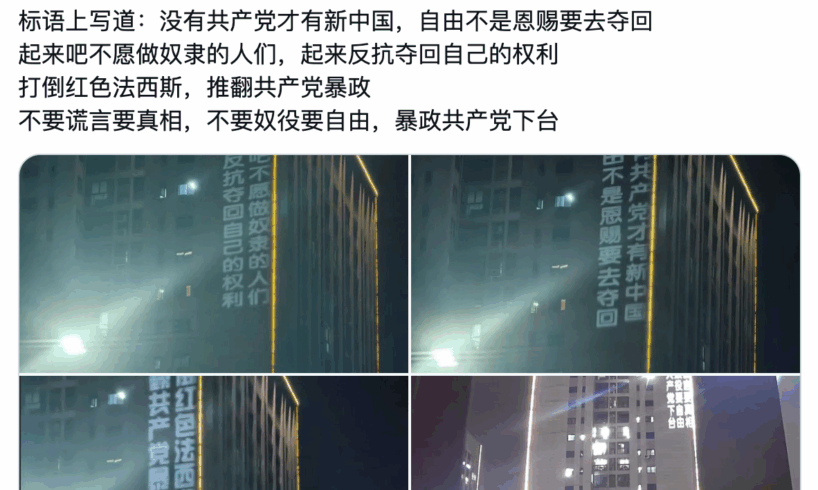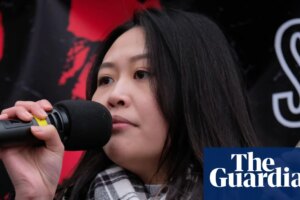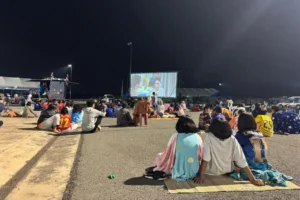
On the evening of August 29, Chinese Valentine’s Day, passersby in Chongqing’s University Town neighborhood met with an astonishing sight: eye-catching political slogans – some inspired by Peng Lifa’s October 2022 Sitong Bridge Protest – were being projected on the exterior wall of a high-rise building. The slogans read as follows: “Only without the Communist Party will there be a New China.” “Freedom is not something bestowed; we must fight to reclaim it.” “Arise, those who do not wish to be slaves, and reclaim your rights.” “Down with Red fascism and Communist Party tyranny.” “We want truth, not lies; we want freedom, not slavery.” “The tyrannical Communist Party must step down.”
A post shared on Teacher Li’s X account described the protest and included four images of the slogans being projected on the building in Chongqing. The post generated widespread interest on X, and thus far has racked up 20 million views, 22,000 likes, 4,200 retweets, and 2,500 comments:
The slogans call to mind a number of influences. “Only without the Communist Party will there be a New China” is a play on the CCP slogan “Without the Communist Party, there would be no New China.” The phrasing “Arise, those who do not wish to be slaves, and reclaim your rights” seems inspired by the Chinese lyrics of the Communist anthem “The Internationale.” And the words “We want truth, not lies; we want freedom, not slavery” closely resemble the slogans used by lone protester Peng Lifa in his influential October 2022 protest at Sitong Bridge in Beijing—words that were echoed later that year by the White Paper protesters: “We want freedom, not lockdowns; elections, not rulers. We want dignity, not lies. Be citizens, not slaves.”
The slogans in Chongqing remained visible for 50 minutes, before local police gained entry to a hotel room containing equipment that had been projecting the slogans on the side of the building. They also found a note, left for them by a man named Qi Hong, who had rented the hotel room, arranged the equipment, and set the protest in motion before leaving for the U.K. with his family. Another post from Teacher Li’s X account showed security camera footage of five police officers (and another person who appears to be a hotel employee) entering the empty hotel room and finding the projection equipment.
Images of enormous slogans projected on the exterior walls of a building in Chongqing.
Qi Hong’s solitary, remotely executed protest is but the latest in a series of protests by individuals employing slogans, signboards, banners, or loudspeakers to express their dissatisfaction with repressive Party-state governance in China. Some trace their origin to Peng Lifa’s unfurling of banners with anti-lockdown and anti-Xi political slogans at Beijing’s Sitong Bridge in October of 2022. (Peng was detained immediately after the protest, and his whereabouts are unknown. His wife, daughters, and other family members remain under police surveillance.) In November and December of that year, during the White Paper protests that helped to bring an end to China’s draconian pandemic lockdowns, many young demonstrators shouted slogans inspired by Peng’s banner protest.
Several other small-scale political protests have taken place this year. On August 9, a delivery driver at Suzhou’s MixC Mall carried a whiteboard proclaiming, “Power is only accountable to its source. The Chinese people demand the right to vote.” On August 7, a man stood outside of Kunming’s Anti-Japanese War Memorial Hall and displayed a banner reading “Xi Jinping must go!” This spring, on April 15, a man in Chengdu, Sichuan province, unfurled red and white banners from a pedestrian overpass. The banners featured three political protest slogans: “There can be no ‘national rejuvenation’ without systemic political reform,” “The People do not want a political party with unchecked power,” and “China does not need someone to ‘point the way forward.’ Democracy is the way forward.”
In an August 30 YouTube interview with Yuan Li, host of the Bumingbai podcast, Qi Hong (who did not appear onscreen, for his safety) explained a bit about his background and motivations for organizing the remote protest. He acknowledged drawing inspiration from Peng Lifa’s 2022 Sitong Bridge protest, as well as the February 2023 remotely executed slogan-projection protest at Wanda Plaza, a mall in the city of Jinan, Shandong province. The latter protest, which used a remotely operated projector to display the slogans “Overthrow the Communist Party. Overthrow Xi Jinping,” was timed to coincide with the start of the Second Plenary Session of the 20th Central Committee of the Communist Party of China and the Two Sessions in Beijing. It was planned and executed by a 29-year-old man named Chai Song, who later fled to the U.S.
In the interview with Yuan Li, Qi Hong described growing up in an impoverished mountain village near Chongqing, dropping out of school at 16, and working as a migrant in Beijing, where he was frequently the target of police brutality and even spent some time in a detention center. After 2006, his life began to improve: he earned enough as an e-commerce entrepreneur to purchase a house and a car, and he eventually married and had children. But in the years following 2019, his firsthand experience with political repression, food safety scandals, ultranationalist education, and pandemic lockdowns left him deeply disillusioned with Chinese society and politics. His goal in carrying out the Chongqing protest, he said, was not to pursue “violent revolution,” but to create a kind of performance art to express his inner feelings and perhaps “kindle a fire” in the hearts of young Chinese like himself. As Qi Hong wrote in the note he left behind for the police, “We must wake up to the truth, for truth is truth. Just as clouds blocking the sun don’t mean the sun isn’t there, if everyone does their bit to resist, it means the bad guys won’t be able to act with impunity.”
Bumingbai’s full interview with Qi Hong is available in the embedded link below.





